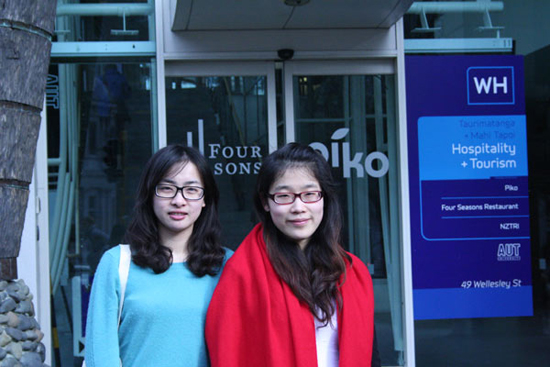
Chinese students make up the largest proportion of international students in New Zealand. To achieve a better academic performance, they should exert more effort than is expected of them to adapt to an educational environment different from what they experienced back home.
It was 11:30pm - a Monday night like all the others. Jenny Gu looked through her tight timetable for Tuesday and Wednesday before tidying up her lecture notes, shutting down her laptop and going to bed in a rental apartment.
Checking her schedule had become a regular habit after the awful coincidence of her class and the KFC job. She finally chose to skip class, for the first time, because of her first part-time job since coming to New Zealand's largest city, Auckland, 11 months and 12 days ago.
Gu shared a similar background with Vivy He, her friend, and Tristan Liu. All three are aged 23. They are Chinese – members of the largest contingent making up the international students in New Zealand, although the enrolment of Chinese students has dropped right back from a peak of 56,000 in 2003.
The plunge came to a stop in 2008. Since then, Chinese enrolment had stabilised at about 21,000, or about 21.6 percent of all international students, according to a report issued in March by the New Zealand Ministry of Education.
In a different situation from He, who is living in a university student apartment, Jenny and Tristan followed most international students' practice of renting a flat farther from the campus. This helped them save about NZ$400 a month.
"The cost of living here was relatively cheaper than in other English-speaking educational destinations like Australia, the UK and the US. But it remained a financial burden for a Chinese family like us with an income slightly better than the average," said Liu, whose parents were ordinary wage earners in Shanghai – China’s financial centre and largest city by population.
Hard-won job
To Gu's relief, she found a part-time job in KFC, a hard-won job offer, during the semester break in early July. After that, she was less worried about the shrinking value of renminbi, or yuan, when He was complaining to her about the continuous appreciation of the New Zealand dollar since March.
"I could earn NZ$65 (RMB353) for five hours' work a week," said Gu. "The wage was a small amount compared to the annual NZ$21,800 tuition fees paid by my parents. But the chicken feed helped. I was less cost-conscience than before when buying consumables."
Jenny's current target was to achieve a B average or better over her two-semester graduate diploma courses.
She had earned a bachelor degree in English language in a Chinese college last year. The major seemed to make no sense in an English-speaking country. She had to choose a new programme if pursuing further study.
Taking into account the relatively lower cost of tuition fees and a more prospective career future, Jenny opted for graduate diploma courses in international hospitality management at AUT University, one of the eight state-funded universities in New Zealand. If attaining the aim of a B average, the one-year full time study could guarantee her an offer place in postgraduate diploma courses.
That target seemed somewhat challenging. Language was the first barrier to overcome.
"The major problem affecting my academic performance was language," said an AUT business undergraduate who revealed his Chinese name as Zhang Chen.
Lecturers' words
"It was impossible for Chinese students to completely catch all of the lecturers' words. We would be awfully confused if the lecturer illustrated something by citing a typical Kiwi case."
The boy from southern China's Guangdong province believed that if he managed to overcome language barriers, he could make a better performance than most of his Kiwi peers.
Gu couldn't agree more. She was struggling to understand the humor in class when her Kiwi peers or those from European countries and the US laughed to themselves silly. Like most of her fellow countrymen, Jenny hated to say "pardon" for a recap of whatever she failed to grasp. In consequence, she had to spend more time after class in self-study to make up for what she had missed in class.
Accomplishing her assignments has not been an easy job either. Regular assignments, mostly essays and reports, carry weighty marks in the semester's assessment.
The grading system is different from that used in a Chinese university, which more heavily relies on semester-end exams. In her first term, Gu earned higher marks in exams but her essays and reports turned out poor.
It was the same case with Liu, He and Zhang.
"My lecturer failed to understand what I meant to express in my essays even if there was nothing grammatically wrong with the expression," complained Liu.
Logical way
He also violated the taboo of not presenting his ideas in a logical way.
"Your discussion of the graph is still mixing the ideas of trend and seasonal component in one sentence," his lecturer commented on his essay. "You first should discuss the trend, and then discuss the seasonal component."
The two hurdles really frustrate most Chinese-speaking students, according to Marlene Lu, manager and student advisor of AUT Chinese Centre, which was set up in 2001 to help an influx of Chinese students adapt to a totally new environment.
"More than half of those seeking help either suffered language barriers or had assignment phobia," said Lu, a Chinese-born Kiwi. "Some Chinese students failed a course because of poorly written essays or reports. You could never imagine they would have done an essay without a reference or quote."
But the impediments could be overcome in the long run. That was Lu's belief.
"If you found the origin of problems and were willing to address them, half the battle was won," she told those seeking help. "Find a way to address the issues, and after that, spend more time exercising with the way you've found."
The Chinese Centre arranged regular workshops to solve Chinese students' typical problems, inviting lecturers to share skills improving essay writing, report writing and use of APA referencing.
Frequented workshops
Gu was among those frequenting these workshops. She and He also spoke highly of the lectures given by peer tutors organised by the centre.
"The problems baffling you had all previously been encountered by your peers. But they eventually overcame them. Their experiences therefore made them the best lecturers."
It was 11:55pm. A new day was coming. Gu lay in bed, listening to her favorite song by Hayley Westenra, her eyes fast closing. "I never saw a blue like that before. Across the sky, around the world."
She didn't know what it would be like if she saw that blue. But her current target was to see it.



